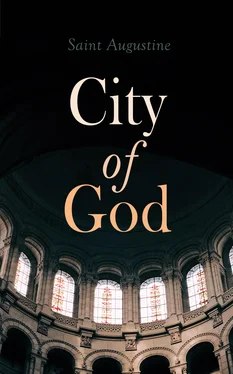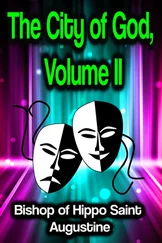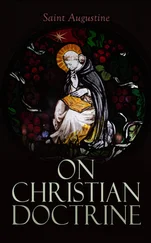Saint Augustine
Treatise on the State of God Against the Pagans
Translator: Marcus Dods
e-artnow, 2021
Contact: info@e-artnow.org
EAN: 4064066309190
Volume I. VOLUME I. Table of Contents
Volume II.
Table of Contents Table of Contents Volume I. VOLUME I. Table of Contents Volume II.
Table of Contents
Editor's Preface.
Book First.
Book Second.
Book Third.
Book Fourth.
Book Fifth.
Book Sixth.
Book Seventh.
Book Eighth.
Book Ninth.
Book Tenth.
Book Eleventh.
Book Twelfth.
Book Thirteenth.
Table of Contents
"Rome having been stormed and sacked by the Goths under Alaric their king, 1the worshippers of false gods, or pagans, as we commonly call them, made an attempt to attribute this calamity to the Christian religion, and began to blaspheme the true God with even more than their wonted bitterness and acerbity. It was this which kindled my zeal for the house of God, and prompted me to undertake the defence of the city of God against the charges and misrepresentations of its assailants. This work was in my hands for several years, owing to the interruptions occasioned by many other affairs which had a prior claim on my attention, and which I could not defer. However, this great undertaking was at last completed in twenty-two books. Of these, the first five refute those who fancy that the polytheistic worship is necessary in order to secure worldly prosperity, and that all these overwhelming calamities have befallen us in consequence of its prohibition. In the following five books I address myself to those who admit that such calamities have at all times attended, and will at all times attend, the human race, and that they constantly recur in forms more or less disastrous, varying only in the scenes, occasions, and persons on whom they light, but, while admitting this, maintain that the worship of the gods is advantageous for the life to come. In these ten books, then, I refute these two opinions, which are as groundless as they are antagonistic to the Christian religion.
"But that no one might have occasion to say, that though I had refuted the tenets of other men, I had omitted to establish my own, I devote to this object the second part of this work, which comprises twelve books, although I have not scrupled, as occasion offered, either to advance my own opinions in the first ten books, or to demolish the arguments of my opponents in the last twelve. Of these twelve books, the first four contain an account of the origin of these two cities—the city of God, and the city of the world. The second four treat of their history or progress; the third and last four, of their deserved destinies. And so, though all these twenty-two books refer to both cities, yet I have named them after the better city, and called them The City of God."
Such is the account given by Augustine himself 2of the occasion and plan of this his greatest work. But in addition to this explicit information, we learn from the correspondence 3of Augustine, that it was due to the importunity of his friend Marcellinus that this defence of Christianity extended beyond the limits of a few letters. Shortly before the fall of Rome, Marcellinus had been sent to Africa by the Emperor Honorius to arrange a settlement of the differences between the Donatists and the Catholics. This brought him into contact not only with Augustine, but with Volusian, the proconsul of Africa, and a man of rare intelligence and candour. Finding that Volusian, though as yet a pagan, took an interest in the Christian religion, Marcellinus set his heart on converting him to the true faith. The details of the subsequent significant intercourse between the learned and courtly bishop and the two imperial statesmen, are unfortunately almost entirely lost to us; but the impression conveyed by the extant correspondence is, that Marcellinus was the means of bringing his two friends into communication with one another. The first overture was on Augustine's part, in the shape of a simple and manly request that Volusian would carefully peruse the Scriptures, accompanied by a frank offer to do his best to solve any difficulties that might arise in such a course of inquiry. Volusian accordingly enters into correspondence with Augustine; and in order to illustrate the kind of difficulties experienced by men in his position, he gives some graphic notes of a conversation in which he had recently taken part at a gathering of some of his friends. The difficulty to which most weight is attached in this letter, is the apparent impossibility of believing in the Incarnation. But a letter which Marcellinus immediately despatched to Augustine, urging him to reply to Volusian at large, brought the intelligence that the difficulties and objections to Christianity were thus limited merely out of a courteous regard to the preciousness of the bishop's time, and the vast number of his engagements. This letter, in short, brought out the important fact, that a removal of speculative doubts would not suffice for the conversion of such men as Volusian, whose life was one with the life of the empire. Their difficulties were rather political, historical, and social. They could not see how the reception of the Christian rule of life was compatible with the interests of Rome as the mistress of the world. 4And thus Augustine was led to take a more distinct and wider view of the whole relation which Christianity bore to the old state of things,—moral, political, philosophical, and religious,—and was gradually drawn on to undertake the elaborate work now presented to the English reader, and which may more appropriately than any other of his writings be called his masterpiece5 or life-work. It was begun the very year of Marcellinus' death, a.d. 413, and was issued in detached portions from time to time, until its completion in the year 426. It thus occupied the maturest years of Augustine's life—from his fifty-ninth to his seventy-second year.6
From this brief sketch, it will be seen that though the accompanying work is essentially an Apology, the Apologetic of Augustine can be no mere rehabilitation of the somewhat threadbare, if not effete, arguments of Justin and Tertullian.7 In fact, as Augustine considered what was required of him,—to expound the Christian faith, and justify it to enlightened men; to distinguish it from, and show its superiority to, all those forms of truth, philosophical or popular, which were then striving for the mastery, or at least for standing-room; to set before the world's eye a vision of glory that might win the regard even of men who were dazzled by the fascinating splendour of a world-wide empire,—he recognised that a task was laid before him to which even his powers might prove unequal,—a task certainly which would afford ample scope for his learning, dialectic, philosophical grasp and acumen, eloquence, and faculty of exposition.
But it is the occasion of this great Apology which invests it at once with grandeur and vitality. After more than eleven hundred years of steady and triumphant progress, Rome had been taken and sacked. It is difficult for us to appreciate, impossible to overestimate, the shock which was thus communicated from centre to circumference of the whole known world. It was generally believed, not only by the heathen, but also by many of the most liberal-minded of the Christians, that the destruction of Rome would be the prelude to the destruction of the world.8 Even Jerome, who might have been supposed to be embittered against the proud mistress of the world by her inhospitality to himself, cannot conceal his profound emotion on hearing of her fall.
Читать дальше












